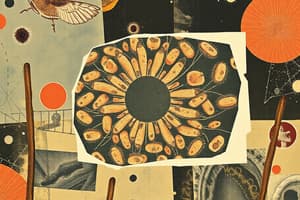Podcast
Questions and Answers
Who is credited with building the first compound microscope?
Who is credited with building the first compound microscope?
- Robert Hooke
- Theodor Schwann
- Anton van Leeuwenhoek
- Zacharias Janssen (correct)
What was Robert Hooke reminded of when he discovered cells under a microscope?
What was Robert Hooke reminded of when he discovered cells under a microscope?
- Beehives
- Roman architecture
- Honeycombs
- Monk's cells in monasteries (correct)
Who came up with the idea that every plant is made of cells?
Who came up with the idea that every plant is made of cells?
- Robert Hooke
- Matthias Schleiden (correct)
- Rudolph Virchow
- Theodor Schwann
What was the area of research that led to a dispute between Robert Hooke and Sir Isaac Newton?
What was the area of research that led to a dispute between Robert Hooke and Sir Isaac Newton?
Who invented rebreathers for firefighters?
Who invented rebreathers for firefighters?
What was the main point of disagreement between Schleiden and Schwann regarding the cell theory?
What was the main point of disagreement between Schleiden and Schwann regarding the cell theory?
Who showed that cells come from other cells, resolving the final piece of the cell theory?
Who showed that cells come from other cells, resolving the final piece of the cell theory?
What were Anton van Leeuwenhoek's 'animalcules'?
What were Anton van Leeuwenhoek's 'animalcules'?
Study Notes
The Weird History of the Cell Theory
- The cell theory consists of three parts: all organisms are composed of one or more cells, the cell is the basic unit of structure and organization in organisms, and all cells come from preexisting cells.
The Early Days of Microscopy
- In the early 1600s, spectacle maker Zacharias Janssen in the Netherlands built the first compound microscope, which soon became a hot item among scientists.
- Anton van Leeuwenhoek, a fellow Dutchman, built his own microscope and discovered bacteria by examining dental scrapings, which he called "animalcules".
Robert Hooke and the Discovery of Cells
- Robert Hooke, an English scientist, was working in various fields, including physics, chemistry, and biology.
- He discovered cells while examining a piece of cork under a microscope and coined the term "cell" because the chambers reminded him of monk's cells in monasteries.
- Hooke had a tense relationship with Sir Isaac Newton, which led to some of Hooke's research being lost.
The Development of the Cell Theory
- In the 1800s, German scientists Matthias Schleiden and Theodor Schwann discovered that all plants and animals are made of cells, contributing to the development of the cell theory.
- Schleiden, a botanist, studied plants under a microscope and concluded that every plant is made of cells.
- Schwann, who studied animal cells and invented rebreathers for firefighters, came to the same conclusion.
- Schwann and Schleiden collaborated on the cell theory, but disagreed on how cells arise, with Schleiden believing in free-cell formation and Schwann advocating for cells coming from preexisting cells.
The Final Piece of the Cell Theory
- Rudolph Virchow's research showed that cells come from other cells, an idea "borrowed" from Jewish scientist Robert Remak's work, leading to another scientific feud.
Cell Theory
- The cell theory consists of three principles: all organisms are composed of one or more cells, cells are the basic units of structure and organization in organisms, and all cells come from preexisting cells.
Early Microscopy
- Zacharias Janssen built the first compound microscope in the 1600s in the Netherlands.
- Anton van Leeuwenhoek discovered bacteria using his microscope by examining dental scrapings, calling them "animalcules".
Robert Hooke's Discovery
- Robert Hooke, an English scientist, worked in physics, chemistry, and biology.
- He discovered cells while examining cork under a microscope and coined the term "cell" due to the resemblance to monk's cells.
- Hooke had a tense relationship with Sir Isaac Newton, resulting in some of his research being lost.
Development of Cell Theory
- Matthias Schleiden, a botanist, discovered that every plant is made of cells using a microscope.
- Theodor Schwann studied animal cells and invented rebreathers for firefighters.
- Schwann and Schleiden collaborated on the cell theory, but disagreed on cell formation, with Schleiden believing in free-cell formation and Schwann advocating for cells coming from preexisting cells.
Final Piece of Cell Theory
- Rudolph Virchow's research showed that cells come from other cells, an idea inspired by Robert Remak's work.
- Virchow "borrowed" Remak's idea, leading to a scientific feud.
Studying That Suits You
Use AI to generate personalized quizzes and flashcards to suit your learning preferences.
Description
Explore the fascinating history of cell theory and microscopy, from Zacharias Janssen's compound microscope to Anton van Leeuwenhoek's contributions. Learn about the three parts of the cell theory and its significance in science.




